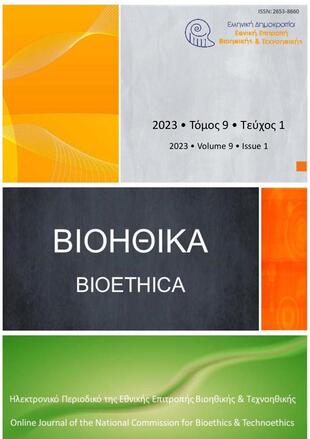Ηθικά διλήμματα από την εφαρμογή της Τεχνητής Νοημοσύνης σε κλινικές μελέτες
Аннотация
Η εφαρμογή της Τεχνητής Νοημοσύνης στις Κλινικές Μελέτες εγείρει πολλά ηθικά διλήμματα σχετικά με τη διασφάλιση των δεδομένων των υποκειμένων, τη διαφάνεια των διαδικασιών, την επίδραση που θα έχει στη σχέση του ασθενούς με τον ιατρό και στη λήψη αποφάσεων υγείας. Για να διερευνηθούν τα διλήμματα αυτά, πραγματοποιήθηκε βιβλιογραφική αναζήτηση και συλλέχθηκαν δεδομένα από κλινικές μελέτες, στις οποίες εφαρμόστηκε κάποιο αλγοριθμικό μοντέλο. Παρατηρήθηκε πως οι εφαρμογές της Τεχνητής Νοημοσύνης στη παρακολούθηση της υγείας των ασθενών, στην ανακάλυψη νέων θεραπευτικών προσεγγίσεων, στη διαγνωστική και στη φροντίδα χρόνιων νοσημάτων δημιουργούν θετικά ή μη κατώτερα αποτελέσματα από τις κλασσικές μεθόδους. Ωστόσο ανακύπτουν διάφορα, σημαντικά βιοηθικά ζητήματα όπως η ύπαρξη μεροληπτικών στοιχείων στα μοντέλα, η μη προστασία των ευαίσθητων δεδομένων των υποκειμένων, η αδυναμία απόδοσης ευθυνών σε περίπτωση σφαλμάτων και η ανάδειξη της νομοθετικής ανεπάρκειας σε θέματα συναίνεσης των υποκειμένων. Το μέλλον της Τεχνητής Νοημοσύνης στην Υγεία είναι μακρύ και κρίνεται αναγκαία η περαιτέρω διερεύνηση των ηθικών διλημμάτων στην έρευνα, με σκοπό την οριοθέτηση των υποχρεώσεων, ευθυνών και δικαιωμάτων τόσο των υποκειμένων όσο και των υπολοίπων εταίρων που συμμετέχουν στις κλινικές μελέτες όπου εφαρμόζεται Τεχνητή Νοημοσύνη.
Article Details
- Как цитировать
-
Σαργιώτης Γ.-Χ. (2023). Ηθικά διλήμματα από την εφαρμογή της Τεχνητής Νοημοσύνης σε κλινικές μελέτες. Bioethica, 9(1), 50–68. https://doi.org/10.12681/bioeth.34074
- Выпуск
- Том 9 № 1 (2023): Bioethica
- Раздел
- Reviews

Это произведение доступно по лицензии Creative Commons «Attribution» («Атрибуция») 4.0 Всемирная.
Authors who publish with this journal agree to the following terms:
- Authors retain copyright and grant the journal right of first publication with the work simultaneously licensed under a Creative Commons Attribution CC BY 4.0 License, which allows for immediate free access to the work and permits any user to read, download, copy, distribute, print, search, or link to the full texts of articles, crawl them for indexing, pass them as data to software, or use them for any other lawful purpose. Appropriate credit must be given by citing the author(s) and the original publication in this journal.
- Authors are able to enter into separate, additional contractual arrangements for the non-exclusive distribution of the journal's published version of the work (e.g. post it to an institutional repository or publish it in a book), with an acknowledgement of its initial publication in this journal.
We encourage authors to deposit their articles, as well as data underlying the publications, in institutional and/or other appropriate subject repositories.
Bioethica permits and encourages authors to archive the final publication pdf in institutional (e.g. the repository of the National Hellenic Research Foundation) or other appropriate subject repositories (e.g. SSOAR repository for social sciences), in compliance with institutional and/or funder open access policies, after publication in the BIOETHICA. Authors must provide bibliographic details that credit publication in the journal, as well as related funding details (when applicable).
Lists of institutional and other subject-based academic open access repositories can be found listed by country at the registry http://opendoar.org/countrylist.php
If your institution does not possess a repository you may deposit a copy of your paper at no cost with www.zenodo.org , the repository supported for open access research in the EU by the European Commission, through the project OpenAIRE (www.openaire.eu )



